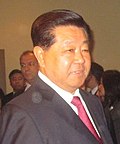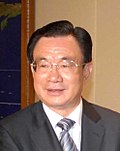List of provincial-level leaders
CCP Party Secretaries
| No. | Image | Name | Term start | Term end | Ref. |
|---|---|---|---|---|---|
| 1 |  | Zhang Dingcheng (1910–2000) | August 1949 | October 1954 | [1] [2] |
| 2 |  | Ye Fei (1914–1999) | October 1954 | May 1967 | [3] [2] |
| Cultural Revolution Interregnum | 1967 | 1971 | [3] [2] [4] | ||
| 3 |  | Han Xianchu (1913–1986) | 1971 | 1974 | [3] [2] |
| 4 | Liao Zhigao (1913–2000) | 1974 | 1980 | [3] [2] | |
| 5 | Xiang Nan (1918–1997) | 1980 | March 1986 | [3] [2] [4] | |
| 6 | Chen Guangyi (born 1933) | March 1986 | December 1993 | [3] [2] | |
| 7 |  | Jia Qinglin (born 1940) | December 1993 | October 1996 | [5] |
| 8 | Chen Mingyi (born 1940) | October 1996 | November 2000 | [5] | |
| 9 | Song Defu (born 1946–2007) | November 2000 | December 2004 | [6] | |
| 10 |  | Lu Zhangong (born 1952) | December 2004 | 30 November 2009 | [7] |
| 11 |  | Sun Chunlan (born 1950) | 30 November 2009 | 21 November 2012 | [8] |
| 12 |  | You Quan (born 1954) | 19 December 2012 | 28 October 2017 | [9] |
| 13 | Yu Weiguo (born 1955) | 28 October 2017 | 30 November 2020 | [10] | |
| 14 |  | Yin Li (born 1964) | 1 December 2020 | 13 November 2022 | [11] |
| 15 |  | Zhou Zuyi (born 1965) | 13 November 2022 | Incumbent | [12] |
Chairpersons of Fujian People's Congress
- Liao Zhigao (廖志高): 1979–1982
- Hu Hong (胡宏): 1982–1985
- Cheng Xu (程序): 1985–1993
- Chen Guangyi (陈光毅): 1993–1994
- Jia Qinglin (贾庆林): 1994–1998
- Yuan Qitong (袁启彤): 1998–2002
- Song Defu (宋德福): 2002–2005
- Lu Zhangong (卢展工): 2005–2010
- Sun Chunlan (孙春兰): 2010–2013
- You Quan (尤权): 2013–2018
- Yu Weiguo (于伟国): 2018–2021
- Yin Li (尹力): 2021–present
Governors
| No. | Officeholder | Term of office | Political party | Ref. | ||
|---|---|---|---|---|---|---|
| Took office | Left office | |||||
| Governor of the Fujian Provincial People's Government | ||||||
| 1 |  | Zhang Dingcheng (1898–1981) | 17 August 1949 | October 1954 | Chinese Communist Party | [13] |
| 2 |  | Ye Fei (1914–1999) | October 1954 | February 1955 | [14] | |
| Governor of the Fujian Provincial People's Committee | ||||||
| 2 |  | Ye Fei (1914–1999) | February 1955 | January 1959 | Chinese Communist Party | [14] |
| 3 | Jiang Yizhen (1915–1994) | January 1959 | October 1959 | [15] | ||
| – | Wu Hongxiang (1914–2005) | April 1960 | June 1962 | [16] | ||
| 3 | Jiang Yizhen (1915–1994) | November 1962 | December 1962 | [15] | ||
| 4 | Wei Jinshui (1906–1992) | December 1962 | May 1967 | [17] | ||
| Director of the Fujian Revolutionary Committee | ||||||
| 6 |  | Han Xianchu (1913–1986) | May 1967 | August 1968 | Chinese Communist Party | [18] |
| Director of the Fujian Provincial Military Control Committee of the People's Liberation Army | ||||||
| 7 |  | Han Xianchu (1913–1986) | August 1968 | December 1973 | Chinese Communist Party | [18] |
| 8 | Liao Zhigao (1913–2000) | November 1974 | December 1979 | [19] | ||
| Governor of the Fujian Provincial People's Government | ||||||
| 9 | Ma Xingyuan (1917–2005) | December 1979 | January 1983 | Chinese Communist Party | [20] | |
| 10 | Hu Ping (1930–2020) | January 1983 | September 1987 | [21] | ||
| 11 |  | Wang Zhaoguo (born 1941) | September 1987 | November 1990 | [22] | |
| 12 |  | Jia Qinglin (born 1940) | November 1990 | March 1994 | [23] | |
| 13 | Chen Mingyi (born 1940) | March 1994 | October 1996 | [24] | ||
| 14 |  | He Guoqiang (born 1943) | October 1996 | August 1999 | [25] | |
| 15 |  | Xi Jinping (born 1953) | August 1999 | October 2002 | [26] [27] | |
| 16 |  | Lu Zhangong (born 1952) | October 2002 | December 2004 | [28] | |
| 17 |  | Huang Xiaojing (born 1946) | December 2004 | April 2011 | [29] [30] | |
| 18 | Su Shulin (born 1962) | 2 April 2011 | 7 October 2015 | [31] [32] | ||
| 19 | Yu Weiguo (born 1955) | 26 November 2015 | 2 January 2018 | [33] [34] | ||
| 20 |  | Tang Dengjie (born 1964) | 2 January 2018 | 2 July 2020 | [35] [36] | |
| 21 |  | Wang Ning (born 1961) | 2 July 2020 | 22 October 2021 | [37] [38] | |
| 22 |  | Zhao Long (born 1967) | 22 October 2021 | Incumbent | [39] [40] | |
Chairmen of Fujian CPPCC
- Zeng Jingbing (曾镜冰): 1955–1956
- Jiang Yizhen (江一真): 1956–1959
- Ye Fei (叶飞): 1959–1964
- Fan Shiren (范式人): 1964–1977
- Liao Zhigao (廖志高): 1977–1979
- Wu Hongxiang (伍洪祥): 1979–1985
- Yuan Gai (袁改): 1985–1988
- Chen Guangyi (陈光毅): 1988–1993
- You Dexin (游德馨): 1993–2003
- Chen Mingyi (陈明义): 2003–2008
- Liang Qiping (梁绮萍): 2008–2013
- Zhang Changping (张昌平): 2013–2018
- Cui Yuying (崔玉英): 2018–present
